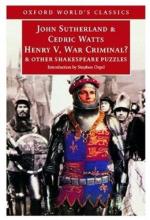|
This section contains 10,627 words (approx. 36 pages at 300 words per page) |

|
Robin Headlam Wells, University of Hull
"O for a Muse of fire!" What more appropriate way to begin an epic celebration of England's greatest warrior-king than an invocation to Mars, the baleful god of war with 'famine, sword and fire' straining like leashed greyhounds at his heels (Prol. 1-8)?1 Praised by his contemporaries as the flower of knighthood,2 the historical Henry V was the epitome of English chivalry; and chivalry is essentially a martial ideal, a code of values that glorified military prowess as the supreme achievement of the virtuous knight.3 For the medieval chevalier like Shakespeare's Duke of Exeter (4.6.7-32) death on the battlefield in the arms of a brother soldier while in the service of his liege is a consummation devoutly to be wished.
It is this chivalric ideal that the "warlike Harry" epitomizes. Shakespeare's holy warrior has "an aspect of iron" (5.2.239); his god is a...
|
This section contains 10,627 words (approx. 36 pages at 300 words per page) |

|


